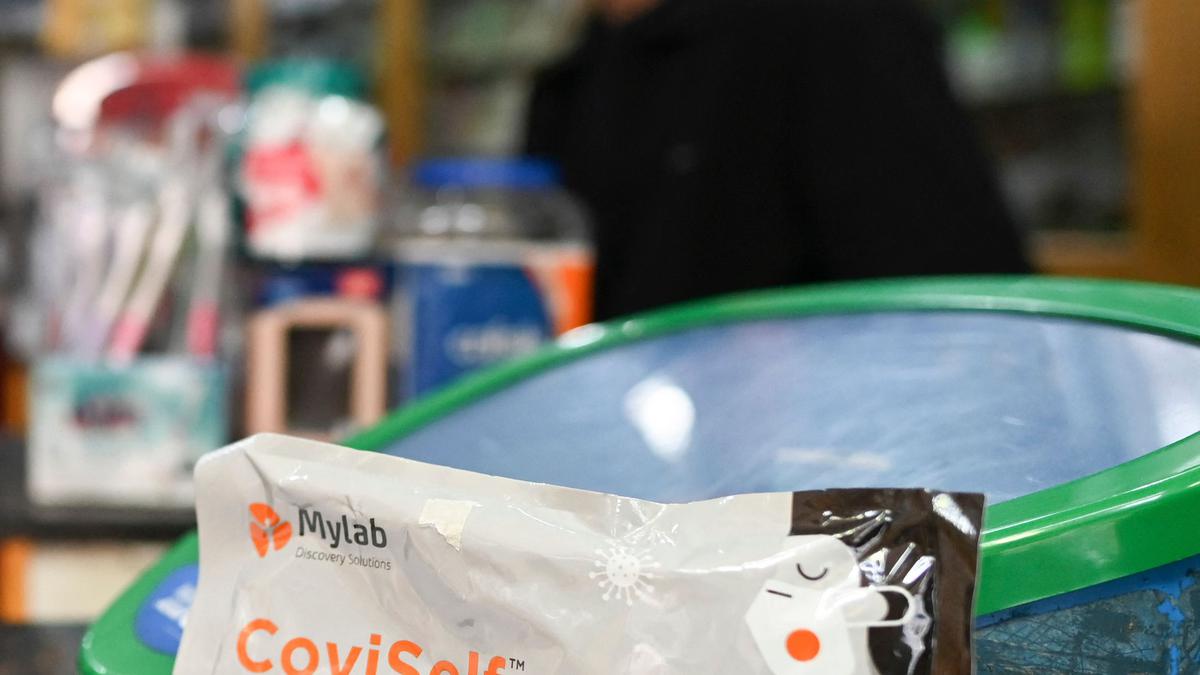
Pharmacists direct customers seeking COVID-19 self-test kits to hospitals
The Hindu
Pharmacies in Bengaluru redirect customers seeking self-test kits to hospitals to help with record keeping of positive cases. Masks & sanitizers demand lower due to absence of reported cases.
As COVID-19 is back in the news with the emergence of the JN.1 variant, the demand for self-test kits has increased in Bengaluru. However, instead of selling these kits to the customers, pharmacies are redirecting them to hospitals to help with record keeping of positive cases.
A manager at a pharmacy on Brigade Road said that the demand for self-test kits was around 200 per day. He also said that most pharmacies were not maintaining that kind of stock. “There has been a notable uptick in the demand for self-test kits. But, if we encounter customers exhibiting COVID-19-like symptoms seeking medications, we are directing such individuals to nearby hospitals rather than dispensing medication directly,” he said.
Since the earlier waves of COVID-19, the government had mandated pharmacies to maintain records of the persons they sold the kit to and also details of the results of the test. After purchasing the kits, most customers do not come back to update the results, the pharmacists said.
“At pharmacies which are tied to hospitals, self-test kits are not given without a prescription from the physicians. Hence, the follow-up becomes easier. That is why we advise people to go there,” said Ravindra Kumar M.J., State Secretary, Karnataka Chemists and Distributors Association.
The pharmacists also noted that, unlike the previous waves, there is no sense of panic among people to buy COVID-related medical supplies like thermometers, pulse-oxymeters, and paracetamol tablets. “Around 20% of customers are aware and responsible this time, others are not caring much,” Mr. Kumar said.
With many educational institutions and private companies making it compulsory for students and employees to wear face masks, the sales of the same has slightly increased in Bengaluru.
M.K. Mayanna, president, Bruhat Bengaluru Chemists and Druggists Association said, “There have been a few inquiries for masks and sanitizers, but the demand is not as pronounced as it was during the peak of the pandemic.” He clarified that the lower demand could be attributed to the absence of reported cases in Bengaluru.

“Writing, in general, is a very solitary process,” says Yauvanika Chopra, Associate Director at The New India Foundation (NIF), which, earlier this year, announced the 12th edition of its NIF Book Fellowships for research and scholarship about Indian history after Independence. While authors, in general, are built for it, it can still get very lonely, says Chopra, pointing out that the fellowship’s community support is as valuable as the monetary benefits it offers. “There is a solid community of NIF fellows, trustees, language experts, jury members, all of whom are incredibly competent,” she says. “They really help make authors feel supported from manuscript to publication, so you never feel like you’re struggling through isolation.”

Several principals of government and private schools in Delhi on Tuesday said the Directorate of Education (DoE) circular from a day earlier, directing schools to conduct classes in ‘hybrid’ mode, had caused confusion regarding day-to-day operations as they did not know how many students would return to school from Wednesday and how would teachers instruct in two modes — online and in person — at once. The DoE circular on Monday had also stated that the option to “exercise online mode of education, wherever available, shall vest with the students and their guardians”. Several schoolteachers also expressed confusion regarding the DoE order. A government schoolteacher said he was unsure of how to cope with the resumption of physical classes, given that the order directing government offices to ensure that 50% of the employees work from home is still in place. On Monday, the Commission for Air Quality Management in the National Capital Region and Adjoining Areas (CAQM) had, on the orders of the Supreme Court, directed schools in Delhi-NCR to shift classes to the hybrid mode, following which the DoE had issued the circular. The court had urged the Centre’s pollution watchdog to consider restarting physical classes due to many students missing out on the mid-day meals and lacking the necessary means to attend classes online. The CAQM had, on November 20, asked schools in Delhi-NCR to shift to the online mode of teaching.









